| Srl | Item |
| 1 |
ID:
125030
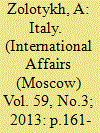

|
|
|
|
|
| Publication |
2013.
|
| Summary/Abstract |
ON FEBRUARY 24-25, Italy held an early parliamentary election, which saw the center-left coalition headed by Democratic Party leader Pier Luigi Bersani win the race and gain 55% of the seats in the Chamber of Deputies. But their slight lead in the Senate, with just five seats more than the center-right bloc's, has called into question the political survivability of the legislature, as well as the government to be formed by Bersani. For Italy, political instability is a familiar and ordinary phenomenon. During the past sixty-five years, 50 governments have succeeded one another there due to political crises. But for all that, the current early election may well prove to be a turning point in the country's political process, which in the last 18 years proceeded, according to Italian experts, under the banner of "Berlusconi-ism."
|
|
|
|
|
|
|
|
|
|
|
|
|
|
|
|
| 2 |
ID:
163001
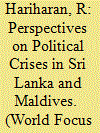

|
|
|
|
|
| Summary/Abstract |
Recently India’s Indian Ocean neighbours – Sri Lanka and Maldives – witnessed political crises after heads of state attempted to tinker with constitution to suit their political ends, plunging the country into chaos and uncertain future. This was due to fractious and personality driven domestic politics practiced in both the countries. However, they have managed to defuse the crises through democratic process, thanks to their own internal political dynamics and external pressure, mainly from the US and the European Union.
|
|
|
|
|
|
|
|
|
|
|
|
|
|
|
|
| 3 |
ID:
150083
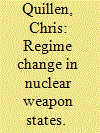

|
|
|
|
|
| Summary/Abstract |
The threat of losing control of nuclear weapons during political crises is not sufficiently prepared for by either individual nuclear powers or the international community. The relative success of securing the Soviet nuclear arsenal after the collapse of the USSR has lulled the world into a false sense of security, but the threat is real and may be increasing. Drawing upon historical case studies in which the government of a nuclear weapon state failed, the author recommends policy options for future scenarios in the hope of preventing potential nuclear disasters in newly proliferating states such as North Korea and Iran.
|
|
|
|
|
|
|
|
|
|
|
|
|
|
|
|
| 4 |
ID:
141277
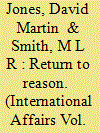

|
|
|
|
|
| Summary/Abstract |
Twenty-first-century political crises stretching from Europe to the Middle East and the Asia–Pacific have undermined the worldview that governed post-Cold War western thinking about a liberal end of history. This worldview assumed that shared norms and transnational institutions would transform the state based-order. In this context, the use of force is considered appropriate only for humanitarian ends meeting a set of predetermined axioms laid down in chapter 7 of the UN Charter. Yet for any strategy to be effective—in an international order subject to change—a clear political aim is required, which might deviate from the general rule. Preoccupied with universal postulates, legal normativism has lost sight of the particular. The argument put forth in this article is that the failure of contemporary western foreign policy in the twenty-first century to address this limitation or to prioritize political ends has led to strategic confusion from Afghanistan to Syria and Ukraine. In this context, it might be useful to reappraise the utility of abstract rationalist approaches to global governance and return instead to an earlier understanding of statecraft that avoided premature generalizations and treated norms as maxims of prudence rather than axioms requiring universal application.
|
|
|
|
|
|
|
|
|
|
|
|
|
|
|
|
| 5 |
ID:
118275
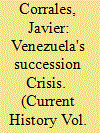

|
|
|
|
|
| Publication |
2013.
|
| Summary/Abstract |
For the opposition to win, the regime must become fairer and more democratic, the ruling party must split, and the opposition must remain united.
|
|
|
|
|
|
|
|
|
|
|
|
|
|
|
|